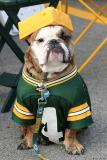Milwaukee, Wisconsin's unique English dialect
There are several English dialects. Within the United States, these dialects don't vary that much, but there are differences.
I'm from Milwaukee, Wisconsin, which has its own peculiar dialect. It's starting to die out now that most young people speak a more standard version of English. Even so, everyone can still understand it.
Read more to learn about some of the unique phrases in my dialect of English!
"by"
In most of the United States, you would say, "I'm going to John's house" or "I was at grandma's house." In my dialect, you could also say, "I'm going by John" or "I was by grandma" -- which most other English speakers would interpret to mean that I was standing near John or grandma, not that I visited their homes.
I heard once that this comes from the German word "bei," but I don't have a credible reference. However, that would make sense given the large number of German immigrants that came to Wisconsin.
"aina"
"It's cold out today, aina hey?"
This means "isn't it" or "aren't they."
"der"
"Down der on da lake."
"Der" means "their," "they're" or "there."
This isn't limited to just this one word: a "d" sound can be substituted for any "th" sound. For example: "da" for "the" and "dem" for "them". This also likely comes from Wisconsin's immigrant past, as many non-native speakers of English replace the unfamiliar "th" sound with a close equivalent.
"yous" or "yous guys"
Standard English uses "you" for both the singular and the plural. Speakers of many English dialects have invented their own plural versions, including "y'all," "you all" or "you guys." In my dialect it's "yous" or "yous guys."






hi dave, they don't mention anything about milwaukee, but as one of our dialects die out, that doesn't nesecarry mean there is less dynamics in the english language. While "der" might eventually leave, a new shorthand replaces it.
http://www.npr.org/2011/01/18/133024500/you-have-an-accent-even-on-twitter
that's about it. have a happy day!
That's a pretty awesome article! Thanks, Stuart!
Though "der" and "de" are really popular subsitutes for the "th" sound (and from what I've noticed the most popular ones in Poland), I have never heard about "yous" form - thanks for sharing it.
Oh, and I guess that the "aina" doesn't evolved straight from "is/are not", but from "ain't", but that's just my opinion. They sound similar and share similar meaning (wich by the way is the same as are/isn't's one :) ). But I'm not native, so these're only my suspicions :)
[...] we can say a number of things that would be incorrect in standard English. I recently wrote a full article about it, but here are a few examples: "I was by grandma on Sunday", "What do yous guys think?", [...]
I have a knack for these phrases in English dialect. These phrases may seem to be grammatically wrong for the modern man but they are actually being used widely and also understood easily. I think they add to local colloquial, very pleasing to listen. Thanks for the resourceful post.
I love to listen to these interesting dialects. I even go on trips to certain places purposefully to listen to particular dialect. I record their voices and listen them later on. I also try to copycat them in my practice before meeting any local person. We shouldn't let these die rather preserve them for their beauty.
Thanks for the comment! What are your favorite dialects?
[...] true that there are lots of dialects (I wrote about my dialect a while back), accents and other variations of English (ex. creoles, such as [...]
[...] I love receiving emails and comments from you guys! [...]